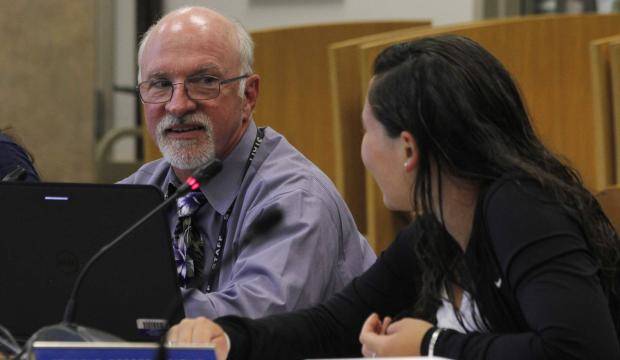The Alaska House of Representatives is expected today to vote on a proposal that would fund the state’s elementary and high schools with $1.2 billion from the state’s Constitutional Budget Reserve and shield them from an end-of-session budget battle.
House Bill 287, as the proposal is formally known, would advance to the Alaska Senate if approved by the House.
“I’m not sure that by itself this is a game-changer, but what it does for sure is get a discussion about education funding into the forefront for the public,” said Juneau schools superintendent Mark Miller.
For the past four years, Miller has been in charge of drafting the multimillion-dollar budget of the Juneau School District. Each time, he has had to do so without knowing how much money the state will contribute.
The district’s budget must be drafted far earlier than the state’s budget, which means Miller — and superintendents across the state — have been left with a critical guessing game.
“What I told the Legislature in simple terms is that if I don’t know how much money I have, I can’t budget, I have to guess. And if I have to guess, I have to guess low,” Miller said. “If I guess high and miss, the results are catastrophic. I’d bankrupt the district.”
Guessing low has consequences as well. Districts across the state are forced to lay off teachers at the end of the school year because they don’t know if they’ll have enough money for them in the following school year.
That uncertainty doesn’t encourage teachers to stay, Miller said, and it’s part of the reason why he and other administrators avidly support HB 287.
By splitting the education budget from the main body of state spending, the Alaska House Majority is attempting to speed the process of school funding and give administrators the security of knowing how much money they will get. The funding in the bill covers the request made by Gov. Bill Walker in December and precludes the possibility of school funding cuts if signed into law.
HB 287 also has a significant side effect: It would likely advance the day of reckoning for Alaska’s fiscal trouble.
Currently, Alaska’s multibillion-dollar annual budget deficit stands between $2.5 billion and $2.8 billion, depending upon the calculations used. Lawmakers are expected to pass some version of Senate Bill 26, a measure that would use a portion of the earnings of the Alaska Permanent Fund to cover government expenses and, in the process, reduce the Permanent Fund Dividend.
Passing SB 26 is expected to reduce the annual deficit to between $600 million and $800 million per year, based on a variety of factors.
The expectation has been that the remaining deficit (after SB 26) will be covered by the Constitutional Budget Reserve, the same fund that HB 287 aims to use.
If HB 287 and SB 26 both pass, that will only be possible for one year. After that, lawmakers will face a fiscal chasm solvable only by draconian budget cuts, taxes, or an unsustainable chunk of the Alaska Permanent Fund.
Rep. Paul Seaton, R-Homer and the sponsor of HB 287, said the bill is not designed to bring that decision more quickly. It merely exposes the problem that already exists.
“I don’t think it forces the issue quicker. What it does do is make it obvious to people that we don’t have a diversity of revenues to fund the budget,” he said.
Seaton and other members of the Alaska House Majority approved an income tax measure last year to address the problem, but it was voted down on the Senate floor by a wide margin.
Sen. Gary Stevens, R-Kodiak, is a rare member of the predominantly Republican Senate Majority who publicly supports an income tax. HB 287 only affects this year’s budget, but Stevens has proposed a measure that would require the Legislature to create a separate education budget every year. Stevens’ bill, SB 131, doesn’t have a requirement that funding come from the CBR. Stevens’ bill requires the Legislature to pass an education budget by April 1.
Speaking Tuesday, Stevens said he thinks neither bill is likely to be accepted by the Senate Majority.
“I’m not sure if the Senate is going to support taking more money out of the CBR,” he said, adding that he expects pushback on his own proposal.
“There is some pushback on my bill as well because it does take education off the table for the end of session as a negotiating tool, but you know if both the Senate and House agree that it’s off the table, then it might work out,” he said.
Seaton warned that if the Senate neglects the two proposals, a budget fix will remain as far away as ever.
“We’re getting closer and closer to that unsustainable draw and what the consequences are,” he said.
• Contact reporter James Brooks at james.k.brooks@juneauempire.com or call 523-2258.

